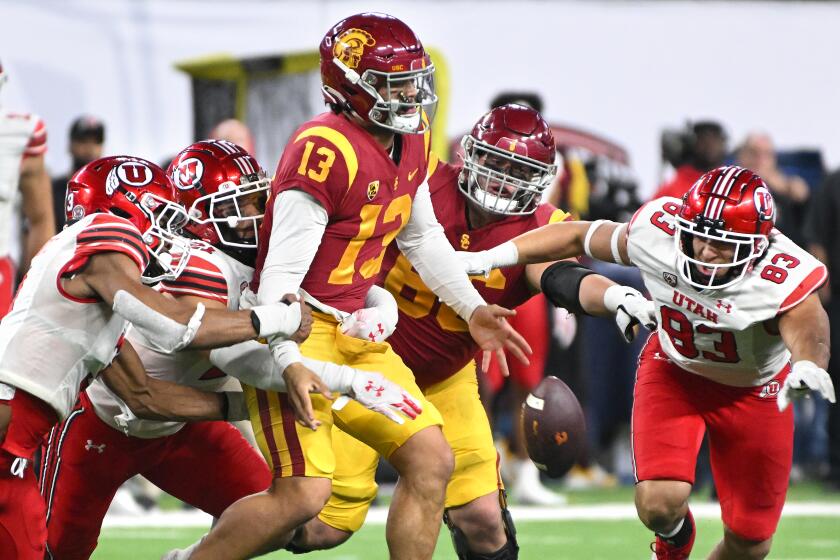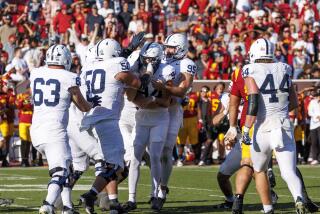USC’s extraordinary season takes a devastating turn as its playoff hopes vanish
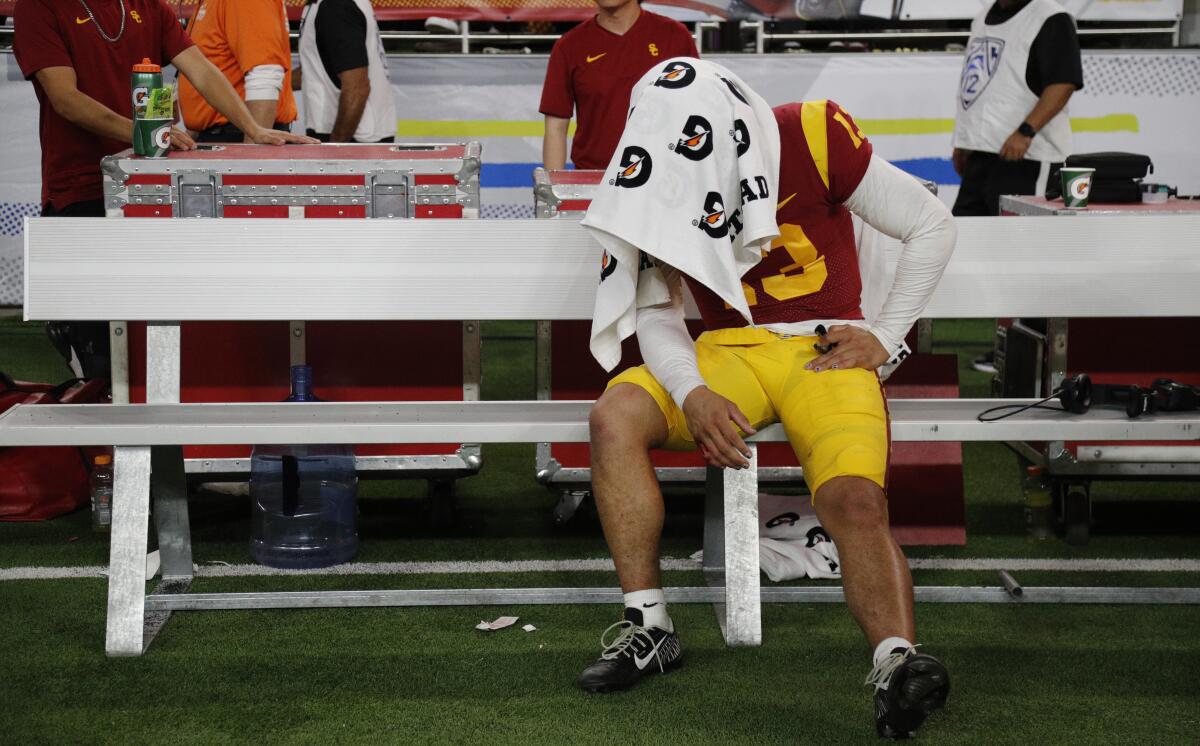
- Share via
LAS VEGAS — Every seemingly impossible step in USC‘s extraordinary yearlong turnaround, from the stunning hire of Lincoln Riley last November to the magical moments constantly conjured by its star quarterback, had for the last year defied any sane expectation, its stunning run all but daring destiny to intervene.
The Trojans had climbed out of the Pac-12 cellar, scratching and clawing their way back from a 4-8 season to the brink of the College Football Playoff. They’d come back in the last minute in Corvallis, held tight in Tucson, roared past their rivals at the Rose Bowl. But by Friday night, a journey few expected had reached an abrupt, unceremonious end, right on the doorstep of a dream season in a 47-24 defeat to Utah.
It ended with Caleb Williams limping, unable to evade a ferocious Utah pass rush, and USC’s defense leaking, unable to tackle a soul. It ended in the cruelest of fashions, with Utah piling on and USC helpless, for the first time all season, to change its fate.
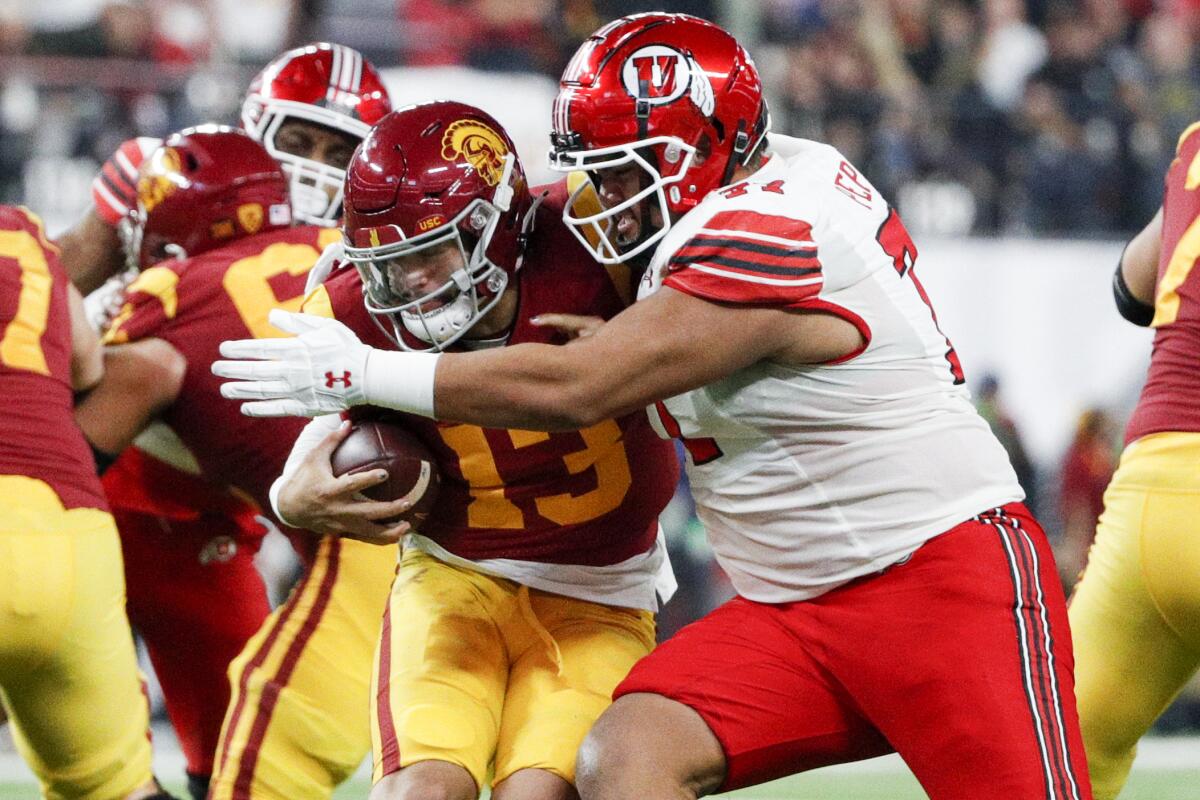
“You get that close to winning a championship and much more,” Riley said, “it’s a tough pill to swallow.”
There wasn’t much USC could handle without its Heisman-bound quarterback at full strength. Williams did his best to battle through the searing pain in his left hamstring, which he “popped” on a 59-yard run in the first quarter. Riley was forced to change the game plan without the use of his quarterback’s legs, relying more on short passes than usual, but still, Williams laced passes across the field in spite of not only his hamstring but a cut on his pinkie finger. He threw for 363 yards and three touchdowns while limping around the pocket, even as Riley tried multiple times to replace his injured passer, who begged to remain in the game.
“That’s as gutsy of a performance as you’ll ever see,” Riley said of Williams.
As he continued to fight, Williams said he tried to channel a lesson he learned from Kobe Bryant.
Questionable decisions by Lincoln Riley do not help USC overcome an injury to Caleb Williams in a surprising loss to Utah in the Pac-12 title game.
“He always said the game is bigger than what you’re feeling,” Williams said. “I was in my head encouraging myself that the game is bigger than what I was feeling.”
But the quarterback’s tireless effort only left him face down on the turf, late in the fourth quarter, as a sea of red roared through Allegiant Stadium, their team on its way to the Rose Bowl.
Where USC will spend its bowl season won’t be determined until Sunday. With a bid to the College Football Playoff semifinals almost certainly out of reach, it’s likely that the Trojans will wind up in one of the remaining New Year’s Six bowls, a fitting consolation after an 11-2 season.
Though, it didn’t feel that way Friday.
“It takes so much to get here, especially where we started from, to not get it done, is very disappointing,” Riley said.
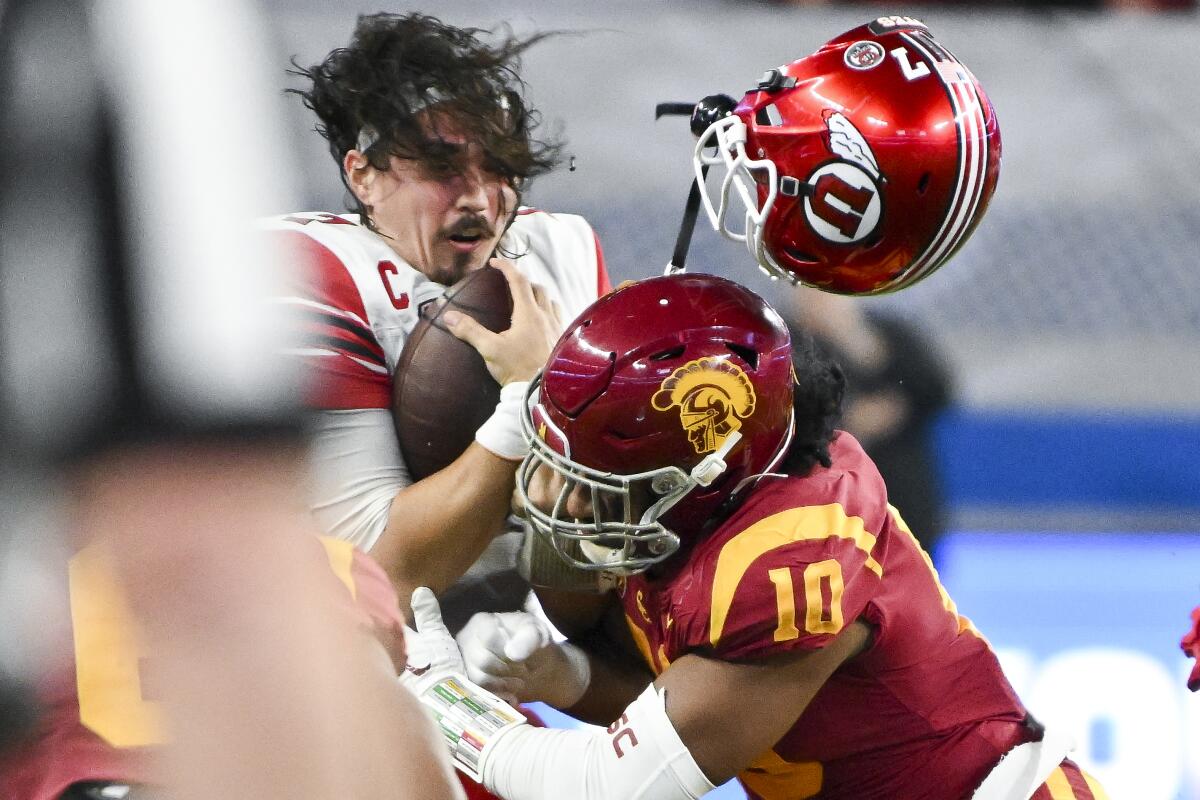
To think, it’d been barely a year since Riley took the reins of a football program that had fallen so steeply from grace. Few of the Trojans faithful would’ve imagined at that most painful of nadirs that USC, with a decade worth of baggage in its wake, could bag a coach like Riley, one of the most respected young minds in the sport. Fewer still could’ve anticipated him rebuilding USC football overnight, turning one of the bleakest points in the program’s history into one of the brightest in the course of a season.
At this time last year, an 11-2 finish and New Year’s Six bowl bid in Riley’s debut season might’ve felt like a best-case scenario, a remarkable turnaround. Perhaps that will be the feeling weeks from now, when calmer minds could prevail and necessary context could be considered.
But on Friday, the failure to push further, to win USC’s first Pac-12 title since 2017 and earn its first bid to the College Football Playoff, was all that was front and center. Even if Riley tried his best to put it into perspective. “We’re not going to walk around like this is some funeral, right?” Riley said.
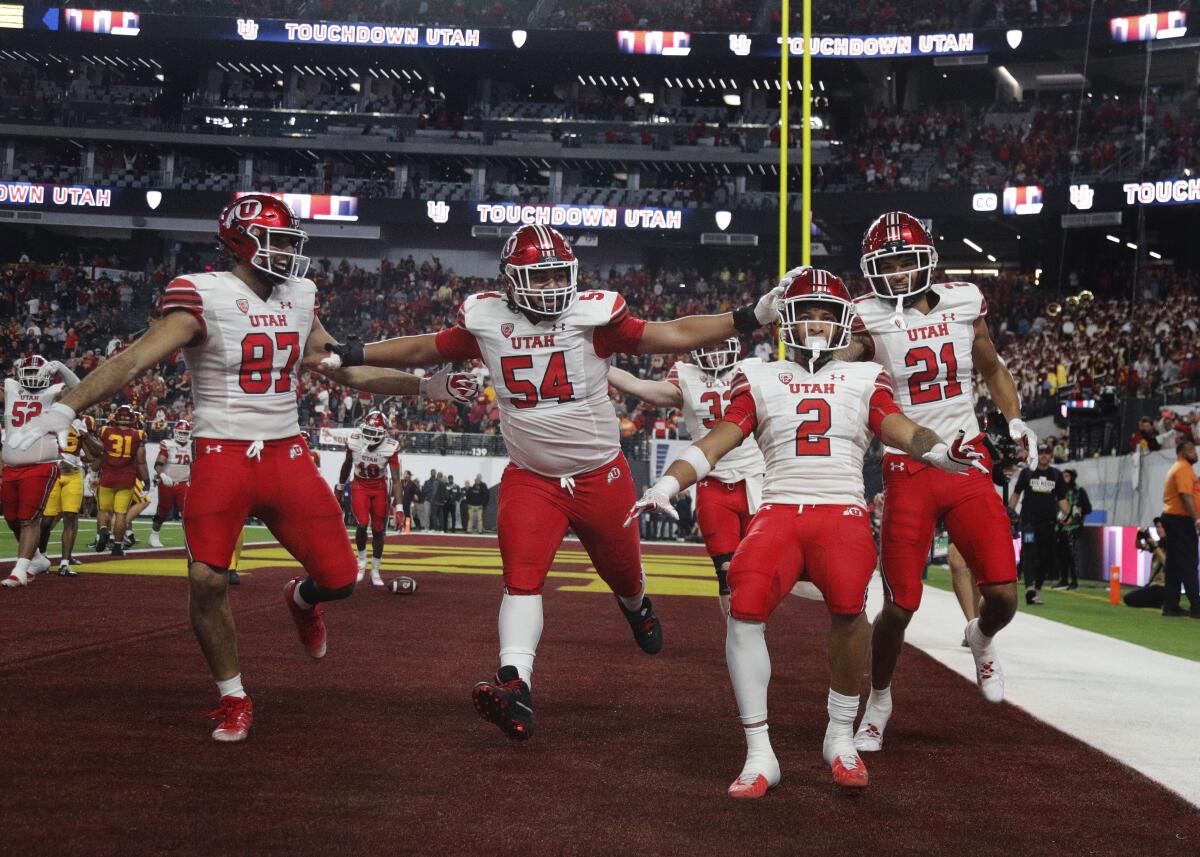
It sure felt that way in the second half, with USC unable to hold off the torrent from Utah, which wasted no time in seizing on the Trojans’ vulnerabilities. The Utes racked up 533 yards, not much less than they’d managed on USC in October, when they dealt the Trojans their first defeat.
The script Friday night would feel painfully familiar. Williams soared from the start, conjuring his usual magic downfield. But as he broke through Utah’s front in the first quarter, barreling through one defender, spinning past another, then sprinting forth into the open field, he and the Trojans would pay the price. His hamstring hampered him more and more as the game went along.
For a while still, it seemed one of the best defenses in college football was all but helpless to stop USC’s star quarterback. By the end of the first quarter, he had torched Utah for 110 yards passing and two touchdowns through the air, along with 76 more on the ground.
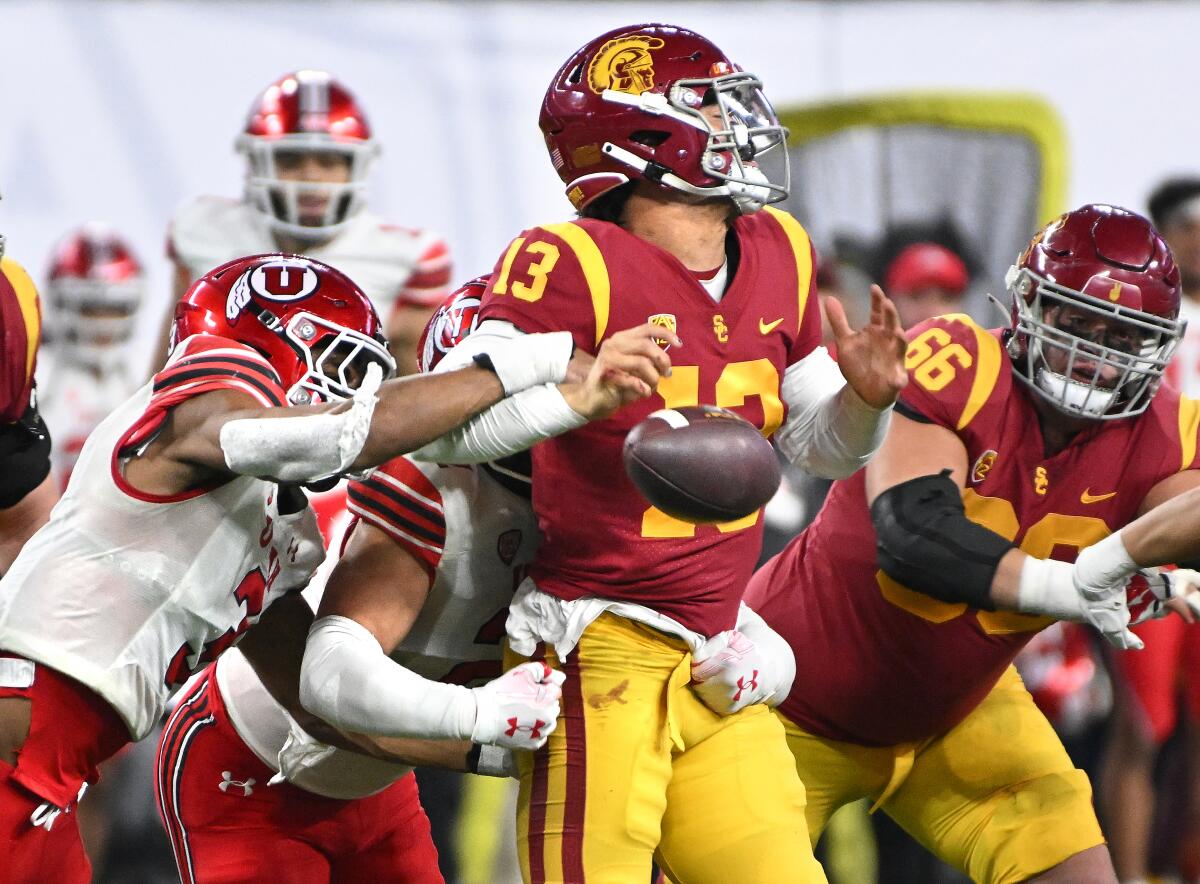
Up 17-3, it seemed only a matter of time before the Trojans stomped on the gas pedal and sped off toward a smooth Pac-12 title.
But just like in their October meeting, when the Trojans also bolted to a two-touchdown lead, Utah simply refused to fold. Tackling from USC’s defense grew sloppier by the drive. By the third quarter, with Williams barely able to move around the pocket, it’d become a full-blown horror show.
Still, he stuck it out. Even as USC’s defense was derailed, Williams would do his best to will USC back from the brink. Down 10 points in the fourth quarter, he hit Jordan Addison on one leg for a 48-yard gain.
But after a year of magical moments and fortunate turns, Williams dropped back on the edge of the red zone, ready to lead a comeback through the pain. He threw an interception instead, leaving USC just short of the dream season it so desired.
More to Read
Go beyond the scoreboard
Get the latest on L.A.'s teams in the daily Sports Report newsletter.
You may occasionally receive promotional content from the Los Angeles Times.

